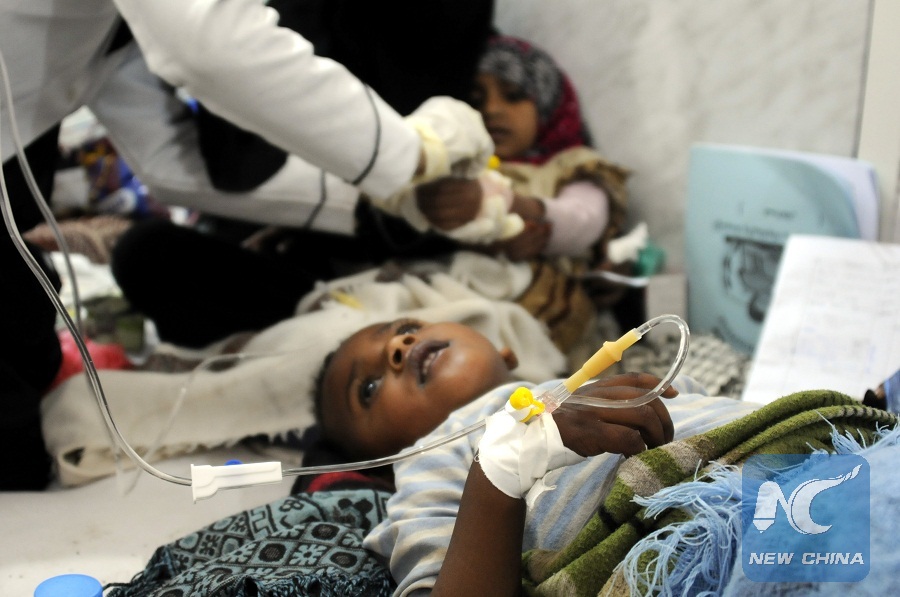
A cholera-infected girl receives medical treatment at the corridor of a hospital in Sanaa, Yemen, on May 13, 2017. A cholera outbreak in Yemen has killed 51 people in two weeks and caused around 2,752 suspected cases since April 27, the World Health Organization (WHO) said on Thursday in a statement on its website. (Xinhua/Mohammed Mohammed)
SANAA, May 14 (Xinhua) --The International Committee of the Red Cross (ICRC) warned Sunday of a very serious cholera outbreak in Yemen as hospitals are struggling to cope with increasing numbers of patients.
At a press conference in capital Sanaa, the ICRC Operations Director Dominik Stillhart said more than 8,500 suspected cholera cases have been reported in 14 governorates of Yemen during April 27 and May 13.
"Unfortunately, 115 people have died from cholera (during this period). This is extremely serious," he said.
"The conflict has taken a very serious toll on the water supply, the health system, the sanitation system as well as the economy and that all are about to collapse," he added.
The cholera outbreak in Yemen was first announced by Yemen's Ministry of Public Health and Population on Oct. 6, 2016.
The World Health Organization has warned the healthcare system in Yemen is on the verge of collapse as many hospitals have shut down. It said only 45 percent of Yemen's hospitals are operational at the moment, but are facing shortages of supplies and staffs.
Late last month, the ICRC's director for the Middle East, Robert Mardini, said the ICRC is stepping up its operations and doubling its budget for the country this year to 90 million U.S. dollars.
Adnan Hizam, communication officer at the ICRC's Sanaa Office, said their activities are now focused on providing food and medication support to the most war-affected areas in Yemen.
"We are active in cities where conflict is escalating, including Sanaa, Taiz, Lahj and Dhali," he said, adding that scarcity of aid funds and security concerns are on top of challenges the ICRC is facing amid the ongoing conflict. "What people need here is much more than we can provide or have at the moment."
In 2015, gunmen killed two ICRC workers in Yemen while they were driving on a mission in the far north. In the same year, gunmen kidnapped an ICRC employee who was released a year later.
Yemen has the world's largest crisis since 1945. Two thirds of its population, around 19 million, need either humanitarian or protection aid and around seven million are close to famine, the UN has said.
Relief organizations are facing big challenges while trying to help the Yemeni people as the war is continuing to rage and expand. On top of these challenges are fund shortages, lack of access to most affected areas because of unabated battles and security concerns, aid agencies have said.
Last month, the UN in association with the governments of Sweden and Switzerland sponsored a meeting on Yemen during which donor states and organizations pledged more than one billion dollars in urgent aid to face the humanitarian crisis in the country.
Calls are now growing on donors to fulfill their pledges and accelerate the release of aid.

